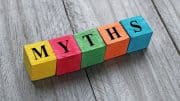Glucomannan: A weight loss cure or wallet lightener?
I recently saw an ad on a website for a supplement called glucomannan. It is sold at GNC and Walmart, and I have thought of trying it. What is it, does it work, is it safe?
Overweight and obesity are at near epidemic levels, and most people are looking for an easy fix to lose weight. Glucomannan may or may not be one of those products, and more studies are needed. Glucomannan is an alternative treatment for weight gain.
What is glucomannan?
Glucomannan is a water-soluble, fermentable dietary fiber that is extracted from the tuber or root. The tuber is from the elephant yam or konjac which is native to Asia. In Asia, glucomannan powder has been used for thousands of years as both food and traditional homeopathic medicine.
The fibers of glucomannan consist of repeating polysaccharide chains. Because our salivary and pancreatic amylase enzymes break the linkages, glucomannan passes unchanged into the colon and out of the body. Fermentation by colonic bacteria causes the only changes that occur to the fiber. Because glucomannan is an extensively large sugar chain that is larger than most fibers we eat, it pulls more water into the colon and can absorb up to 50 times its weight in water[1]. Because of its size, glucomannan can be taken in smaller doses than other types of fiber supplements.
The mechanism for weight loss is simple. The mechanism is thought to be similar to other fibers that we add to our diet through food or supplement. Fiber causes increased water within the gastrointestinal tract and expansion and displacement of energy macronutrients within the stomach and bowel walls and therefore cause increased satiety[2].
Is there any research that looked at the use of glucomannan for weight loss?
Yes and no. The first study I reviewed of this article was “Safety and Efficacy of Glucomannan for Weight Loss in Overweight and Moderately Obese Adults, ” and it was published in Journal of Obesity in 2013. The study enrolled 53 subjects that were randomized into two groups which were either given a placebo or glucomannan and tested at two and eight weeks. The weakness of this study is only had 53 participants, and it was only eight weeks long. A longer study might be warranted. This result was confirmed by prior studies[3],[4],[5],[6].
There are other studies that are larger that show a clinical benefit. One study from 2008 entitled “Effect of glucomannan on plasma lipid and glucose concentrations, body weight, and blood pressure: systematic review and meta-analysis” was published in the American Journal of Clinical Nutrition. The objective of the study was to perform a meta-analysis of randomized controlled trials of glucomannan to better characterize its impact on plasma lipids, fasting blood glucose, body weight, and blood pressure. The study included data from fourteen studies with a total of 531 subjects. The researchers determined that glucomannan appears to beneficially affect total cholesterol, LDL cholesterol, triglycerides, body weight, and fasting blood glucose (18842808). There are other studies to back this finding up[7],[8],[9],[10],[11].
The studies I reviewed show some weak evidence that taking glucomannan orally might help reduce body weight in obese. However, some research I examined shows conflicting evidence and the positive evidence shows a very small benefit.
Is taking glucomannan safe?
Probably. The side-effects report by most studies were mild. Adverse effects include symptoms such as flatulence, abdominal pain, and gastrointestinal obstruction have been reported. The rare risk of esophageal obstruction[12] and acute hepatitis of the cholestatic type has been reported[13].
The bottom line: Glucomannan has been in the United States as a food additive and dietary supplement despite the fact that evidence is lacking for weight loss. Despite widespread use and availability, the studies that support the use are limited and should be studied with longer and more extensive studies. I would not recommend the use of for weight loss.
References:
-
Birketvedt, GS, M Shimshi, T Erling, and J Florholmen. “Experiences with Three Different Fiber Supplements in Weight Reduction.” Medical Science Monitor : International Medical Journal of Experimental and Clinical Research 11, no. 1 (January 1, 2005): PI5-8. [PubMed]
-
Cairella, M, and G Marchini. “[Evaluation of the action of glucomannan on metabolic parameters and on the sensation of satiation in overweight and obese patients].” La Clinica terapeutica 146, no. 4 (April 1, 1995): 269–74. [PubMed]
-
Doi, K. “Effect of Konjac Fibre (Glucomannan) on Glucose and Lipids.” European Journal of Clinical Nutrition 49 Suppl 3 (October 1, 1995): S190-7. [PubMed]
-
Henry, DA, AS Mitchell, J Aylward, MT Fung, J McEwen, and A Rohan. “Glucomannan and Risk of Oesophageal Obstruction.” British Medical Journal (Clinical Research Ed.) 292, no. 6520 (March 1, 1986): 591–92. [PubMed]
-
Keithley, Joyce K., Barbara Swanson, Susan L. Mikolaitis, Mark DeMeo, Janice M. Zeller, Lou Fogg, and Jehan Adamji. “Safety and Efficacy of Glucomannan for Weight Loss in Overweight and Moderately Obese Adults.” Journal of Obesity 2013 (2013): 1–7. https://doi.org/10.1155/2013/610908.
-
Livieri, C, F Novazi, and R Lorini. “[The use of highly purified glucomannan-based fibers in childhood obesity].” La Pediatria medica e chirurgica : Medical and surgical pediatrics 14, no. 2 (March 1, 1992): 195–98. [PubMed]
-
Salas-Salvadó, J, X Farrés, X Luque, S Narejos, M Borrell, J Basora, A Anguera, et al. “Effect of Two Doses of a Mixture of Soluble Fibres on Body Weight and Metabolic Variables in Overweight or Obese Patients: A Randomised Trial.” The British Journal of Nutrition 99, no. 6 (June 1, 2008): 1380–87. [PubMed]
-
Vasques, CA, S Rossetto, G Halmenschlager, R Linden, E Heckler, MS Fernandez, and JL Alonso. “Evaluation of the Pharmacotherapeutic Efficacy of Garcinia Cambogia plus Amorphophallus Konjac for the Treatment of Obesity.” Phytotherapy Research : PTR 22, no. 9 (September 1, 2008): 1135–40. [PubMed]
-
Vido, L, P Facchin, I Antonello, D Gobber, and F Rigon. “Childhood Obesity Treatment: Double Blinded Trial on Dietary Fibres (Glucomannan) versus Placebo.” Padiatrie Und Padologie 28, no. 5 (January 1, 1993): 133–36. [PubMed]
-
Villaverde, AF, S Benlloch, M Berenguer, Rayón Miguel, R Pina, and J Berenguer. “Acute Hepatitis of Cholestatic Type Possibly Associated with the Use of Glucomannan (Amorphophalus Konjac).” Journal of Hepatology 41, no. 6 (December 1, 2004): 1061–62. [PubMed]
-
Vita, PM, A Restelli, P Caspani, and R Klinger. “[Chronic use of glucomannan in the dietary treatment of severe obesity].” Minerva medica 83, no. 3 (March 1, 1992): 135–39. [PubMed]
-
Walsh, DE, V Yaghoubian, and A Behforooz. “Effect of Glucomannan on Obese Patients: A Clinical Study.” International Journal of Obesity 8, no. 4 (January 1, 1984): 289–93. [PubMed]
-
Wood, RJ, ML Fernandez, MJ Sharman, R Silvestre, CM Greene, TL Zern, S Shrestha, et al. “Effects of a Carbohydrate-Restricted Diet with and without Supplemental Soluble Fiber on Plasma Low-Density Lipoprotein Cholesterol and Other Clinical Markers of Cardiovascular Risk.” Metabolism: Clinical and Experimental 56, no. 1 (January 1, 2007): 58–67. [PubMed]









Be the first to comment on "Visitor Question: Does glucomannan work?"